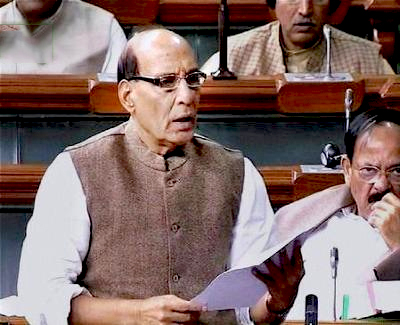New Delhi, Jul 20: Union home minister Rajnath Singh said on Tuesday that nine people have been arrested and four police official have been suspended in connection with the attacks on Dalits in Una in Gujarat.

Rajnath said PM Narendra Modi condemned the attack as soon as he got to know about the incident.
The home minister said that there has been a sharp decline in attacks on Dalits in Gujarat since the BJP is in power. "During Congress rule in Gujarat, number of cases of atrocities against Dalits were much high," Rajnath said.
Opposition led by Congress on Tuesday forced two adjournments of the Rajya Sabha in the pre-noon session over attacks of Dalits in Gujarat.
Main opposition Congress, BSP and TMC competed with each other in trying to raise the issue more vociferously, throwing the House into a pandemonium and forcing two adjournments, first for 10 minutes and then for about 30 minutes till noon.
No sooner the listed papers were laid, Derek O'Brien (TMC) was up on his feet raising the issue. "Dalits are being oppressed in Gujarat but it is not being discussed here," he said as other members joined in.
"This is an organised crime that is happening in Gujarat ... this issue should be taken up," he said referring to the stripping and assault on some Dalit men in Gujarat allegedly by members of a local cow vigilante group.
By this time, Congress and BSP members too were on their feet with Leader of the Opposition Ghulam Nabi Azad seeking permission to speak.
Deputy Chairman P J Kurien allowed him but Mayawati (BSP) appeared eager to speak before him saying she wanted to raise a 'point-of-order'.
Congress members asked under what rule does she want to raise point of order as they rushed into the well shouting slogans against the government. They contended that Azad should speak first.
Kurien pleaded with them to return to their seats and let Mayawati, who "is our sister", be allowed to raise her point of order first.
But as none relented, he was forced to adjourn the House for 10 minutes.
When the House met after the brief break, Congress members rushed into the well shouting slogans like "Dalit Virodhi yeh sarkar nahi chalegi, nahi chalegi (this anti-dalit government will not be tolerated)."
BSP members followed suit and matched Congress members in slogan shouting.
In the melee, minister for social justice and empowerment Thawar Chand Gehlot got up to make a statement but his submission could not be heard in the din.
Nevertheless, minister of state for parliamentary affairs Mukhtar Abbas Naqvi prodded him to continue speaking and make his statement.
In the din, Gehlot could only be heard as saying that the state government had taken prompt action over the incident and arrested the accused persons. An inquiry has been ordered and strict action would be taken against those found guilty, he added.





Comments
For the dadri case. Pm was mum. Now bjp scared that they might not get a single vote from dalit community.
Either ban beef permanently on all states. Or allow in all states.
Add new comment